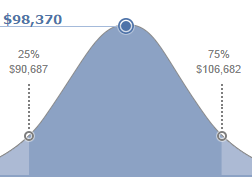What You Can Expect as a Six Sigma Black Belt Salary
If you have been thinking of getting a lean six sigma certification, you would be familiar with various levels (belts) you could attain. You might know by now that the most desirable belt is black (apart from master black belt) as it is a testament to one’s complete understanding of six sigma body of knowledge and the ability to lead and successfully implement quality improvement projects. However, this is not all. In addition to professional recognition, you can expect to earn sizable six sigma black belt salary. Let’s have a look at salary figures as of April 2015.
According to Salary.com, an annual US national median six sigma black belt salary is around $98,370. With this salary you could expect a bi-weekly paycheck of $3,783.
According to Salary.com, an annual US national median six sigma black belt salary is around $98,370. With this salary you could expect a bi-weekly paycheck of $3,783.
And this is a base salary excluding benefits and a bonus. Throwing a bonus into equation would bring a holder of six sigma black belt certification to an annual $101,290. The benefits could add additional 20-30Ks. For comparison, according to Indeed.com six sigma green belts (the certification level just below black) make annual $83,000 as a base pay. Therefore, a six sigma black belt salary is expected to be $15,000 greater than that of a green belt.
The base pay amount of a six sigma black belt salary varies depending where you live. In the nation’s capital Washington DC, you can expect to bank annual $108,600. In San Francisco, California a black belt could make an even higher $120,119 as an annual base salary. If life takes you south to New Orleans, Louisiana, you could still take in slightly above the US national median at $99,058 per year. In smaller towns such as Athens, Georgia you will likely make less than the national median. A typical six sigma black belt salary in this university town will be around $88,926. Being below the median national earnings, this is likely to be a sizable pay relative to the cost of living, as Athens is cheaper than San Francisco or Washington DC.
The base pay amount of a six sigma black belt salary varies depending where you live. In the nation’s capital Washington DC, you can expect to bank annual $108,600. In San Francisco, California a black belt could make an even higher $120,119 as an annual base salary. If life takes you south to New Orleans, Louisiana, you could still take in slightly above the US national median at $99,058 per year. In smaller towns such as Athens, Georgia you will likely make less than the national median. A typical six sigma black belt salary in this university town will be around $88,926. Being below the median national earnings, this is likely to be a sizable pay relative to the cost of living, as Athens is cheaper than San Francisco or Washington DC.
If you feel that the professional recognition and higher earnings justify preparation for a certification exam then it is time to hit the road. You have several options to get trained. You can enroll in an on-line or an on-site training provided by companies such as Villanova University, Gamba Academy etc. Such trainings tend to come with a hefty price tag. But if you need full guidance in your training and don’t mind to drop over $1,000, this might work for you. You should also ask around and see if your company/organization offers any six sigma preparation courses for its employees. Some of the companies do (e.g. Motorla, GE). If you have enough self-discipline and would like to prepare on your own without spending a fortune, you can use free on-line resources. The best on-line free website for six sigma training is www.sixsigmatrainingfree.com. You can also complement your studies with books.
Read more:
How Much It Costs to Take Six Sigma Certification Exam
About Six Sigma Certification
Why Six Sigma Certification
History of Six Sigma
Lean Six Sigma Belt Roles and Responsibilities
Read more:
How Much It Costs to Take Six Sigma Certification Exam
About Six Sigma Certification
Why Six Sigma Certification
History of Six Sigma
Lean Six Sigma Belt Roles and Responsibilities


 RSS Feed
RSS Feed